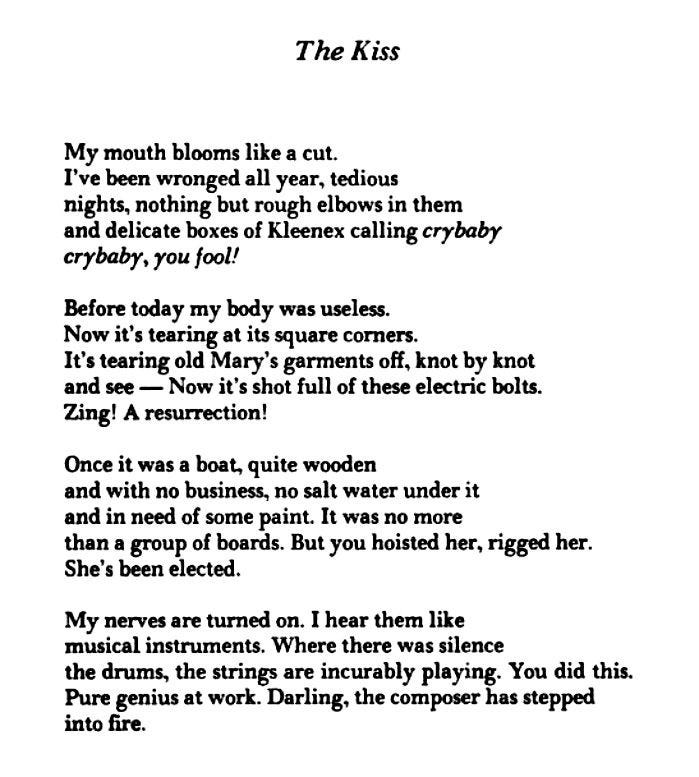Author’s Note: The Poetry Postmortem is where I take a poem I or someone else wrote and I discuss it in a non-workshop way. I am of the opinion that academics and critics have a tendency to suck the life out of poetry. They talk of “critical eyes”, but they are blind to the heart of a poem.
Anne Sexton studied under Robert Lowell, much like her fellow poet, Sylvia Plath. If you take a look at Robert Lowell’s own poetry, you can see how his influence seeped into Sexton and Plath’s work.
While Plath and Lowell use nature in their poetry, Sexton tends to stay away from that. Anne Sexton had quite the tumultuous life, sadly committing suicide when she was forty-five years old. The parallels between Sexton and Plath are indeed well known.
The poem we’ll be looking at today is Sexton’s The Kiss.
On my first read, I hear a distinct voice. It breaks free of his restraints and calls from the rooftop. I believe this poem to be about the body coming alive after feeling the effects of a passionate kiss.
The first line, “My mouth blooms like a cut,” conjures a strong image of a bitten rose birthing itself. An opposite image would be one of a kiss that drew blood.
The rest of the stanza feels very Bridget-Jones with its talk of “nothing but rough elbows” and “delicate boxes of Kleenex.” Sexton talks of her year as “tedious”. Nothing much has been happening to her. There has been no excitement.
She continues in the second stanza with, “Before today my body was useless,” again perpetuating this statement of Sexton feeling she has been made by love. In the next few lines, we are offered symbols of virginity. The use of the word “square” is particularly interesting because one of its meanings is to be stiff or strait-laced. This is backed up by the following mention of “old Mary”. Is this the Virgin Mary?
Anne Sexton is trying to tell us that this kiss has reinvigorated her. Like the tin man, she has been freed from her frozen state. To further reinforce this, Sexton uses onomatopoeia with “Zing!”. She suddenly feels electric.
In the third stanza, she reminds us of what things were like before. She describes her body as “a boat, quite wooden and with no business,” implying this sense of stiffness even further. Later in the stanza, she speaks directly to the giver of said kiss in the lines, “But you hoisted her, rigged her. She’s been elected.”
In the fourth and final stanza, she continues to inform the reader of this electricity: “My nerves are turned on. I hear them like musical instruments.” She utilises the different senses. In its final lines, she again speaks directly to the object of her affections by saying, “You did this. Pure genius at work. Darling, the composer has stepped into fire.” These final lines really tie up the entire poem. Sexton calls the person who kissed her (it is important to mention that the poem indicates that Sexton is a passive party in the kiss) “the composer”.
When you read this poem, I think it is important to be aware of some of the details of Anne Sexton’s life. She was controversially diagnosed with Bipolar Disorder by therapist Martin Orne (her poem You, Doctor Martin is about him). The diagnosis was controversial because of the use of hypnosis and sodium pentothal. It is said that in the various institutions Sexton was committed to, Anne would take on the symptoms of the other patients around her.
Ultimately, I think most find it unsettling that two poets who both wrote under the direction of the same man had similarly tragic lives. They both died of Carbon Monoxide poisoning, subsequently turning to different methods with Anne Sexton using her car and Sylvia Plath using a gas oven.
Both women performed almost ritualistic tasks before their deaths. Sexton donned her mother’s old fur coat, removed her rings, and poured a glass of Vodka. Plath placed a tray of food and drink in her children’s room, sealed herself in the kitchen (making sure none of the gas could affect her children) and rested her head in the oven. Sylvia Plath was thirty-years old when she died and Anne Sexton was forty-five.
With poetry, it is often advised to research the poet to find context clues that may help you understand their angle when it comes to their poetry. Anne Sexton is certainly no exception. She was a troubled woman with an extraordinary talent.
The Kiss is a beautiful poem with enriching images that evoke a myriad of thoughts and implications about its author. With its acute mixture of rich and simple language, Sexton has managed to portray a moment in all our lives that we would be sure to remember.







My latest free verse was posted a week ago with muted response.
I reread it, added text in ()
I know what I originally meant, but on review decided to better clarify.
Am used to writing song lyrics which are especially clarified in the choruses.
The salt in my blood
Talks to me in soft
Rhythmic syllables
Reminding me pulse on pulse
Of the long low low dream
(Rememberings of) sunning in the shallows
With flashes of silver
Deflecting the slow descent
Of sunlight
Settling below the warm
Wash of shorebound waves
(That far away memory
Stored in my cells)
Of diving in the deeps
Beyond coral crowns
Beyond the shelf
Guarding the coastline
That far eventual
Frontier
We crossed with tentative flips
Eons later
Where
We learned
Gasping
To catch
A breath
Out of water.